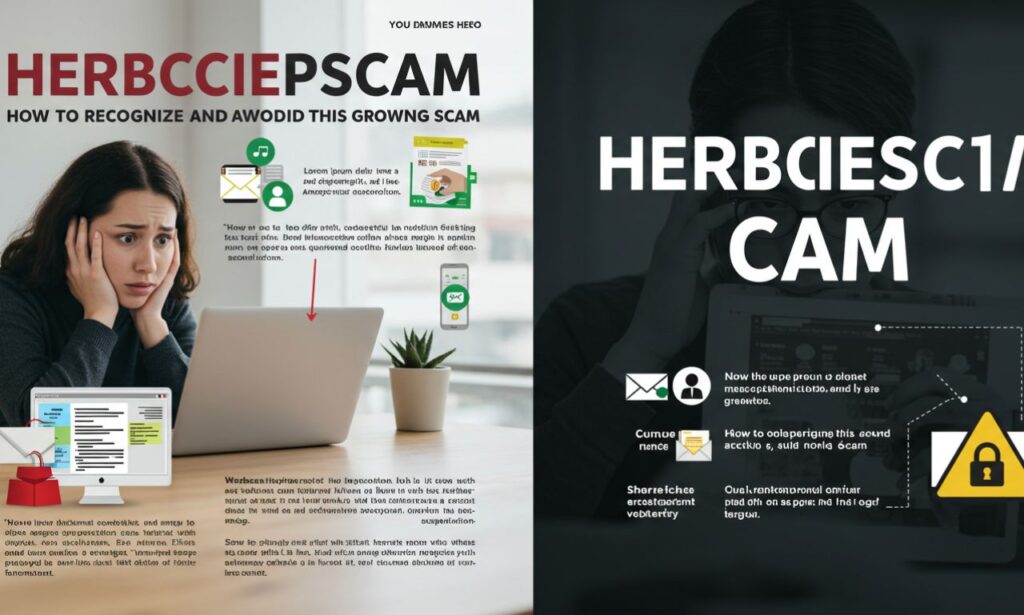As the wellness industry continues to thrive, herbal products have gained immense popularity among health enthusiasts. However, with this surge comes an unfortunate rise in scams targeting unsuspecting consumers. One of the latest threats is Herbciepscam—a deceitful practice that preys on those seeking natural remedies and supplements. Whether you’re a seasoned herbalist or a curious newcomer, it’s crucial to recognize the signs of this growing scam before it’s too late. Let’s delve into what Herbciepscam entails and how you can safeguard yourself from becoming its next victim.
What is Herbciepscam and how does it work?
Herbciepscam is a deceptive scheme that revolves around the sale of herbal products. It often employs misleading tactics to lure unsuspecting consumers into making purchases.
These scams capitalize on the growing interest in natural remedies and health supplements. They promise miraculous results, often with little to no scientific backing.
The scam typically works by creating convincing websites or social media profiles that showcase glowing testimonials and enticing offers. Once a consumer clicks through, they may be asked for personal information, including credit card details.
After placing an order, customers might receive substandard products or nothing at all. In many cases, the perpetrators vanish once payment is made, leaving victims frustrated and without recourse. Understanding this mechanism is crucial for spotting potential red flags before falling victim to herbciepscam activities.
The increasing popularity of herbal products
Herbal products are gaining traction in today’s wellness culture. More people seek natural remedies for various health issues, turning away from synthetic pharmaceuticals.
Social media and online platforms play a significant role in this trend. Influencers tout the benefits of herbs, creating buzz around their effectiveness. This rising popularity has led to an explosion of herbal supplements, teas, and remedies available at our fingertips.
Consumers appreciate the appeal of plant-based solutions that claim fewer side effects compared to traditional medicine. Many believe that nature offers powerful healing properties.
However, with this surge comes a caveat: unregulated markets can lead to misinformation and subpar products flooding the shelves. As demand increases, so does the risk of scams targeting unsuspecting buyers eager for these natural alternatives. Awareness is key in navigating this expanding landscape filled with both promise and peril.
Red flags to look out for when purchasing herbal products online
When shopping for herbal products online, it’s crucial to remain vigilant. One major red flag is a lack of transparency. If the website doesn’t provide clear information about the ingredients or their sourcing, proceed with caution.
Another warning sign is unrealistic claims. Be wary of products that promise miracle cures or rapid results without scientific backing. Health solutions take time and research; if it sounds too good to be true, it probably is.
Check for contact information as well. Legitimate sellers typically offer customer support channels like phone numbers or email addresses. A site lacking this could indicate a scam operation.
Read reviews from verified customers before making any purchases. Consistent negative feedback can reveal underlying issues with product quality or service reliability. Stay informed and protect your health by choosing wisely in the crowded online marketplace.
How to protect yourself from falling victim to Herbciepscam
To protect yourself from Herbciepscam, start by doing thorough research on any herbal product before purchasing. Look for credible sources that provide detailed information on the ingredients and their effects.
Check customer reviews across multiple platforms. Genuine feedback can reveal red flags about a company’s practices or the quality of its products.
Always verify if the seller has a physical address and contact information. Legitimate businesses are transparent about their operations.
Be cautious with deals that seem too good to be true. Unusually low prices often signal potential scams rather than genuine discounts.
Consider using secure payment methods that offer buyer protection, like credit cards or trusted payment services. This provides an extra layer of security against fraudulent transactions.
Trust your instincts. If something feels off during your shopping experience—whether it’s poor website design or lack of information—walk away from the deal. Your intuition is a powerful tool in staying safe online.
Real-life examples of people who have been scammed by Herbciepscam
Sarah, a health-conscious individual, turned to an online herbal supplement advertised as a miracle cure for her chronic fatigue. After placing an order through what seemed like a legitimate website, she waited eagerly for weeks. When the package arrived, it contained nothing but cheap filler products with no trace of the promised herbs.
Then there’s Mike. Seeking relief from anxiety, he found an enticing offer on social media promoting a new herb blend. Trusting the glowing testimonials and flashy ads, he made a purchase only to realize days later that his credit card information had been compromised.
Jessica’s story is equally disheartening. She thought she was supporting small businesses by buying herbal teas online but ended up receiving counterfeit products that caused severe allergic reactions.
These stories highlight just how easy it is to fall victim to Herbciepscam when emotions cloud judgment and due diligence takes a back seat.
Consumer rights and how to report fraudulent activity
Consumers have rights that protect them from fraudulent activity. Understanding these rights is essential for safeguarding your purchases. You deserve to receive products as described and to be treated fairly by sellers.
If you suspect you’ve fallen victim to Herbciepscam, it’s crucial to act quickly. Document all of your transactions, including emails and receipts. This information will be helpful when reporting the scam.
You can report fraudulent activity through various channels. Start with the Federal Trade Commission (FTC) or your local consumer protection agency. They offer guidance on how to proceed and may investigate further.
Additionally, consider sharing your experience on social media or relevant forums. Raising awareness helps others avoid similar pitfalls while providing valuable information for authorities tracking scams like Herbciepscam. Your voice matters in combating fraud effectively!
Conclusion: The importance of being vigilant and doing research before making any purchases
Being vigilant and conducting thorough research before making any purchases is essential, especially in the rapidly expanding world of herbal products. The rise of scams like Herbciepscam highlights a growing concern for consumers who may be unaware of fraudulent practices. By staying informed, you can better protect yourself against deceptive schemes.
Always take the time to check reviews and verify the credibility of sellers. Look for certifications or endorsements from reputable organizations within the herbal industry. Understanding your consumer rights is also crucial; if something feels off about a product or seller, trust your instincts and proceed with caution.
Remember that your health and finances are at stake when purchasing herbal items online. Safeguard yourself by being proactive rather than reactive in this age of information overload. Your diligence today can save you from potential pitfalls tomorrow—stay smart, stay safe, and enjoy exploring the benefits that genuine herbal products have to offer without falling prey to scams like Herbciepscam.







